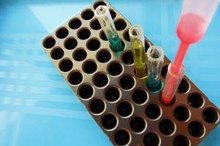What does fact checked mean?
At Healthfully, we strive to deliver objective content that is accurate and up-to-date. Our team periodically reviews articles in order to ensure content quality. The sources cited below consist of evidence from peer-reviewed journals, prominent medical organizations, academic associations, and government data.
The information contained on this site is for informational purposes only, and should not be used as a substitute for the advice of a professional health care provider. Please check with the appropriate physician regarding health questions and concerns. Although we strive to deliver accurate and up-to-date information, no guarantee to that effect is made.
Can Too Much Protein Cause Bad Blood Work Results?
Some blood tests may produce abnormal results because of what you ate or drank before the sample was drawn. The blood urea nitrogen test is one that may be altered with a high protein intake. If you are undergoing blood testing for any reason, always follows your doctor's advice about what you can eat or drink, which will provide the most accurate results, allowing for effective treatment.
If you are experiencing serious medical symptoms, seek emergency treatment immediately.
Blood Urea Nitrogen Test
The BUN test measures how your kidneys and liver are working. It tests the amount of urea nitrogen in your blood. Too much could indicate your kidneys are not functioning as they should. A high BUN reading could also mean you follow a high-protein diet, which may not be healthy for everyone. Testing your BUN is often done as part of a routine blood test to determine the cause of symptoms that don't have a definitive cause. A normal BUN level for men is 8 to 24 milligrams per deciliter and a woman's BUN level should be 6 to 21 milligrams per deciliter. A result higher than 50 milligrams per deciliter indicates a potential problem.
- The BUN test measures how your kidneys and liver are working.
- A high BUN reading could also mean you follow a high-protein diet, which may not be healthy for everyone.
High-Protein Diet
What Is a Normal B12 Count?
Learn More
Many athletes and bodybuilders follow a high-protein diet as a way to support muscle strength and endurance. In this case, you might add protein powders to a diet that contains food sources of protein, such as meat and dairy foods. Following a low-carbohydrate, high-protein diet, such as the Atkins Diet, can also cause elevated BUN levels. A high-protein diet is typically one that includes 1 gram of protein per pound of body weight. Always discuss a high-protein diet with your doctor.
- Many athletes and bodybuilders follow a high-protein diet as a way to support muscle strength and endurance.
- In this case, you might add protein powders to a diet that contains food sources of protein, such as meat and dairy foods.
Test Preparation
If only your BUN levels are being tested, eat and drink as you normally would. Results are more likely to be altered by a long-term high protein intake rather than a single meal that was high in protein. Additional blood tests may require you to fast before the test, so follow the advice of the lab technician or your physician regarding how long you should go without eating before the test 1.
Considerations
Can Diet Increase Albumin Levels?
Learn More
If you have an existing kidney problems, avoid high-protein diets, which can exacerbate the condition. If your blood tests indicate a high BUN level, your doctor may perform additional tests to determine if there is a medical reason for the results 1. It is important to tell your doctor if you eat a lot of protein so that he is able to factor that into your blood test results. Scaling back on the amount of protein in your diet will likely bring your BUN levels back to normal.
- If you have an existing kidney problems, avoid high-protein diets, which can exacerbate the condition.
- If your blood tests indicate a high BUN level, your doctor may perform additional tests to determine if there is a medical reason for the results 1.
Related Articles
References
- Lab Tests Online: BUN
- Josse AR, Atkinson SA, Tarnopolsky MA, Phillips SM. Increased consumption of dairy foods and protein during diet- and exercise-induced weight loss promotes fat mass loss and lean mass gain in overweight and obese premenopausal women. J Nutr. 2011;141(9):1626-34. doi:10.3945/jn.111.141028
- Carreiro AL, Dhillon J, Gordon S, et al. The macronutrients, appetite, and energy intake. Annu Rev Nutr. 2016;36:73–103. doi:10.1146/annurev-nutr-121415-112624
- Ganesan K, Habboush Y, Sultan S. Intermittent fasting: The choice for a healthier lifestyle. Cureus. 2018;10(7):e2947. doi:10.7759/cureus.2947
- Pasiakos SM. Metabolic advantages of higher protein diets and benefits of dairy foods on weight management, glycemic regulation, and bone. J Food Sci. 2015;80 Suppl 1:A2-7. doi: 10.1111/1750-3841.12804
- Delimaris I. Adverse effects associated with protein intake above the recommended dietary allowance for adults. ISRN Nutr. 2013;2013:126929. doi:10.5402/2013/126929
- Bouvard V, Loomis D, Guyton KZ, et al. Carcinogenicity of consumption of red and processed meat. Lancet Oncol. 2015;16(16):1599-1600. doi:10.1016/S1470-2045(15)00444-1
- U.S. Department of Health, U.S. Department of Agriculture. Appendix 7. Nutritional Goals for Age-Sex Groups Based on Dietary Reference Intakes and Dietary Guidelines Recommendations - 2015-2020 Dietary Guidelines.
- Rodriguez NR, Dimarco NM, Langley S. Position of the American Dietetic Association, Dietitians of Canada, and the American College of Sports Medicine: Nutrition and athletic performance. J Am Diet Assoc. 2009;109(3):509-27. doi:10.1016/j.jada.2009.01.005
- Bray GA, Smith SR, de Jonge L, et al. Effect of dietary protein content on weight gain, energy expenditure, and body composition during overeating: a randomized controlled trial. JAMA. 2012;307(1):47-55. doi: 10.1001/jama.2011.1918. Erratum in: JAMA. 2012;307(10):1028.
- Centers for Disease Control and Prevention. Nutrition for Everyone: Protein.
- de Souza RJ, Bray GA, Carey VJ, et al. Effects of 4 weight-loss diets differing in fat, protein, and carbohydrate on fat mass, lean mass, visceral adipose tissue, and hepatic fat: results from the POUNDS LOST trial. Am J Clin Nutr. 2012;95(3):614-25. doi: 10.3945/ajcn.111.026328.
- Fox EA, McDaniel JL, Breitbach AP, Weiss EP. Perceived protein needs and measured protein intake in collegiate male athletes: an observational study. J Int Soc Sports Nutr. 2011;8:9. doi: 10.1186/1550-2783-8-9.
- Phillips SM, Zemel MB. Effect of protein, dairy components and energy balance in optimizing body composition. Nestle Nutr Inst Workshop Ser. 2011;69:97-108; discussion 108-13. doi: 10.1159/000329288.
- Te Morenga LA, Levers MT, Williams SM, et al. Comparison of high protein and high fiber weight-loss diets in women with risk factors for the metabolic syndrome: a randomized trial. Nutr J. 2011;10:40. doi: 10.1186/1475-2891-10-40.
Writer Bio
Eliza Martinez has written for print and online publications. She covers a variety of topics, including parenting, nutrition, mental health, gardening, food and crafts. Martinez holds a master's degree in psychology.









